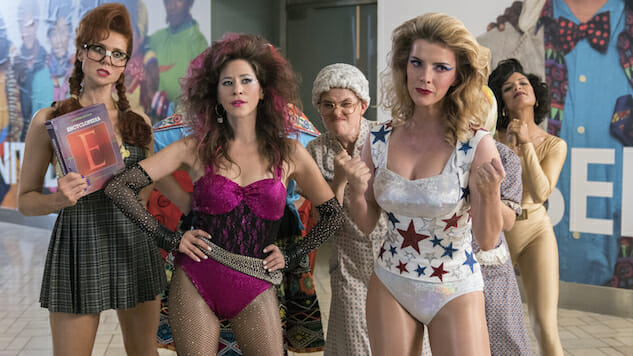In Season Two, GLOW Becomes a Brilliant Backstage Comedy
Photo: Erica Parise/Netflix
Most Netflix series begin in medias res, and then retreat to mere prologue. The first season of GLOW (Gorgeous Ladies of Wrestling, for the uninitiated) is all prologue, and it’s compelling as all get-out: The Reagan-era narrative follows aspiring actress Ruth Wilder (Alison Brie), her former friend, soap star Debbie Eagan (Betty Gilpin), and journeyman director Sam Sylvia (Marc Maron) as they prepare to film the pilot for a local cable station’s wrestling series. Season Two of Netflix’s GLOW opens as Season One of the characters’ GLOW is getting underway: “Ruth, it’s not rocket science, OK?” Sam bristles when Ruth—the self-styled Alma to his Alfred Hitchcock—asks after the format, shortly before the gals sign their (impenetrable, exploitative) contracts:
“Same thing every week. Bunch of promos where you guys talk shit about each other. Then a wrestling match. And then, wrestling match. Wrestling match. Another wrestling match. Then a title match.”
In Maron’s exasperated deadpan, “another wrestling match” is a laugh line, but it’s also a wink—at the structure of an episode, the uses of genre, the problems (and possibilities) of making popular entertainment week after week. In Season Two, from set construction and producing credits to the medium’s disappointing lack of opportunities for women and people of color, GLOW comments constantly on the nature of television, and in the process becomes a brilliant backstage comedy. As Brie says, laughing, when I sit down with her and Maron in Los Angeles in May, “I like to think of it as Larry Sanders with wrestling.”
The “backstage” aspect of Garry Shandling’s groundbreaking late-night satire aside, GLOW’s glimpse at Hollywood sausage-making is much warmer in tone—even, dare I say it, inspirational—in part because the wrestling series within the Netflix series is homemade.
“These girls are literally running the show,” says Britney Young, who plays Carmen “Machu Picchu” Wade. “We have a cameraman, we have someone taking tickets at the door, but the girls are doing the hair and makeup. They’re doing the costumes. They’re helping Sam direct.”
It’s this last part that sets Ruth and Sam’s season-long conflict in motion, and produces the best “backstage” sequence in the season premiere: Ruth, earnest and ambitious, decides to put together the main titles for GLOW, which Sam interprets as a threat to his authority. (Curiously, both Maron and Brie are reluctant to describe this as sexism, even though Sam and Chris Lowell’s dunderheaded announcer/producer, “Bash” Howard, are often instinctively dismissive of the women’s ideas.) Filmed in a mall, replete with an actor working a day job as a rent-a-cop, the montage of the sequence’s creation—set to Billy Joel’s “You May Be Right”—is a loving, funny depiction of the creative impulse. (Ruth also turns out to be more Alfred than Alma.) As cast member Jackie Tohn points out, what differentiates GLOW’s effort to pull back the curtain is the contrast between Netflix’s version and the characters’.
“The show that me, Britney and [co-star] Sydelle [Noel, who plays former stuntwoman Cherry Bang] are making is a fair-sized budget, fairly successful show on a wildly successful network, or streaming service,” says Tohn, who plays the irreverent, sharp-tongued Melanie “Melrose” Rosen. “And it’s interesting, because the show that Cherry, Carmen and Melrose are making is not that. They’re making this rinky-dink, one camera operator, cable access, local, crappy version of this really shiny, beautiful, expensive, incredible thing we’re making.” She calls the show within the show “guerilla filmmaking,” comparing it to her own “YouTube videos and comedy content.” “You don’t ask for permission.” she adds, chuckling. “You just show up and the random ranger at Griffith Park is like, ‘You gotta go.’”
-

-

-

-

-

-

-

-

-

-

-

-

-

-

-

-

-

-

-

-

-

-

-

-

-

-

-

-

-

-

-

-

-

-

-

-

-

-

-

-








































